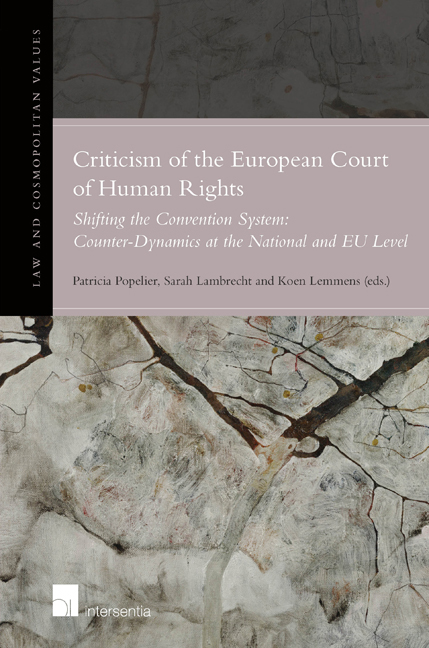 Criticism of the European Court of Human Rights
Criticism of the European Court of Human Rights from PART II - SPARSE CRITICISM
Published online by Cambridge University Press: 13 December 2017
CRITICISM OF THE EUROPEAN COURT OF HUMAN RIGHTS
The European Court for Human Rights (ECtHR) is rarely discussed in critical terms in Swedish media or in contemporary legal and political debate in Sweden. The limited discussion on the role of the ECtHR may be linked to the historical development of the constitutional protection of human rights in Sweden, the status of the convention, and aspects of Swedish legal culture. In this section, the development of constitutional protection of fundamental rights in Sweden is outlined, followed by a section with examples of criticism of the ECtHR.
THE DEVELOPMENT OF CONSTITUTIONAL PROTECTION OF FUNDAMENTAL RIGHTS IN SWEDEN
Ratification of the ECHR
When Sweden ratified the European Convention on Human Rights (ECHR) in 1952, the 1809 Regeringsform (Instrument of Government) was still in force. This old fundamental law had to some extent been inspired by Enlightenment ideals of protection of individuals and separation of powers. As still is the case, the Instrument of Government formed the Swedish constitution together with other fundamental laws. Far-reaching protection of the freedom of the press was set down in a special fundamental law, the Tryckfrihetsforordning (Freedom of the Press Act), tracing its origins to 1766. Apart from the provisions on the freedom of the press, fundamental rights were protected through ordinary legislation rather than constitutional law. There was no equivalent to the catalogues of rights found in constitutions dating from about the same time, eg in the USA or Norway. Furthermore, the changes in the way Sweden was governed that had taken place since the early 20th century – such as the introduction of parliamentarism and universal suffrage – were not reflected in the 1809 Instrument of Government. Later research has labelled the period ca 1920–1975 as the ‘half-a-century without a constitution’. To summarise, at this time constitutional law had a limited role in Sweden, and the status of constitutional protection of human rights was in general very weak. In spite of this, individual rights and freedoms were for the most part respected to a very high degree in Sweden through ordinary legislation and through the practice of the courts and administrative authorities.
To save this book to your Kindle, first ensure [email protected] is added to your Approved Personal Document E-mail List under your Personal Document Settings on the Manage Your Content and Devices page of your Amazon account. Then enter the ‘name’ part of your Kindle email address below. Find out more about saving to your Kindle.
Note you can select to save to either the @free.kindle.com or @kindle.com variations. ‘@free.kindle.com’ emails are free but can only be saved to your device when it is connected to wi-fi. ‘@kindle.com’ emails can be delivered even when you are not connected to wi-fi, but note that service fees apply.
Find out more about the Kindle Personal Document Service.
To save content items to your account, please confirm that you agree to abide by our usage policies. If this is the first time you use this feature, you will be asked to authorise Cambridge Core to connect with your account. Find out more about saving content to Dropbox.
To save content items to your account, please confirm that you agree to abide by our usage policies. If this is the first time you use this feature, you will be asked to authorise Cambridge Core to connect with your account. Find out more about saving content to Google Drive.